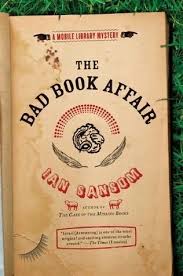Readers of
this blog know I am a proud member of
the Horror Writers Association. One of our biggest contributions is the highest honor in horror fiction,
the Bram Stoker Award. I am pleased to pass on the HWA's press release announcing this year's nominees. Please note, all links are to any posts I have written which mention these works. For the record I am very happy with the list.
###########
For immediate release Contact Lisa Morton, HWA Stoker Event Organizer
February 19, 2010 lisa@lisamorton.com
Horror Writers Association announces
2009 Bram Stoker Award Nominees
Each year, the Horror Writers Association presents the Bram Stoker Awards for Superior Achievement in the field of horror writing, named in honor of Bram Stoker, author of the seminal horror work Dracula. Since 1987, the approximately 500 members of the HWA have recommended, nominated and voted on the greatest works of horror and dark fantasy of the previous calendar year, making the Stokers the most prestigious award in the field of horror literature.
Currently the awards are presented in eight categories: Novel, First Novel, Long Fiction, Short Fiction, Fiction Collection, Anthology, Non-fiction, and Poetry Collection. The organization's Active members will select the winners from this ballot; voting will close on March 3rd, and the awards will be presented this year at a gala banquet on Saturday evening, March 27, at the World Horror Convention in Brighton, UK.
This year's nominees in each category are:
SUPERIOR ACHIEVEMENT IN A NOVEL
Audrey's Door by Sarah Langan (Harper)
Patient Zero by Jonathan Maberry (St. Martin's Griffin)
Quarantined by Joe McKinney (Lachesis Publishing)
Cursed by Jeremy Shipp (Raw Dog Screaming Press)
SUPERIOR ACHIEVEMENT IN A FIRST NOVEL
Breathers by S. G. Browne (Broadway Books)
Solomon's Grave by Daniel G. Keohane (Dragon Moon Press)
Damnable by Hank Schwaeble (Jove)
The Little Sleep by Paul Tremblay (Henry Holt)
SUPERIOR ACHIEVEMENT IN LONG FICTION
Dreaming Robot Monster by Mort Castle (Mighty Unclean)
The Hunger of Empty Vessels by Scott Edelman (Bad Moon Books)
The Lucid Dreaming by Lisa Morton (Bad Moon Books)
Doc Good's Traveling Show by Gene O'Neill (Bad Moon Books)
SUPERIOR ACHIEVEMENT IN SHORT FICTION
"Keeping Watch" by Nate Kenyon (Monstrous: 20 Tales of Giant Creature Terror)
"The Crossing of Aldo Ray" by Weston Ochse (The Dead That Walk)
"In the Porches of My Ears" by Norman Prentiss (Postscripts #18)
"The Night Nurse" by Harry Shannon (Horror Drive-in)
SUPERIOR ACHIEVEMENT IN FICTION COLLECTION
Martyrs and Monsters by Robert Dunbar (Dark Hart Press)
Got to Kill Them All and Other Stories by Dennis Etchison (Cemetery Dance)
A Taste of Tenderloin by Gene O'Neill (Apex Book Company)
In the Closet, Under the Bed by Lee Thomas (Dark Scribe Press)
SUPERIOR ACHIEVEMENT IN ANTHOLOGY (EDITING)
He is Legend: An Anthology Celebrating Richard Matheson edited by Christopher Conlon (Gauntlet Press)
Lovecraft Unbound edited by Ellen Datlow (Dark Horse Books)
Poe edited by Ellen Datlow (Solaris)
Midnight Walk edited by Lisa Morton (Darkhouse Publishing)
SUPERIOR ACHIEVEMENT IN NONFICTION
Writers Workshop of Horror by Michael Knost (Woodland Press)
Cinema Knife Fight by L. L. Soares and Michael Arruda (Fearzone)
The Stephen King Illustrated Companion by Bev Vincent (Fall River Press)
Stephen King: The Non-fiction by Rocky Wood and Justin Brook (Cemetery Dance)
SUPERIOR ACHIEVEMENT IN POETRY COLLECTION
Double Visions by Bruce Boston (Dark Regions)
North Left of Earth by Bruce Boston (Sam's Dot)
Barfodder by Rain Graves (Cemetery Dance)
Chimeric Machines by Lucy A. Snyder (Creative Guy Publishing)
###
More information on the Horror Writers Association is at http://www.horror.org More information on the World Horror Convention is at http://www.whc2010.org













